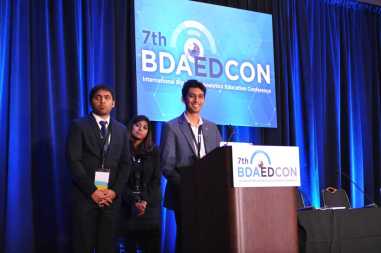Data Literacy—Teach It Early, Teach It Often Data Gurus Tell Conference Goers
- by 7wData

Understanding Big Data and artificial intelligence is not something reserved for computer scientists, said Kirk Borne, principal data scientist for the international consulting firm, Booz Allen Hamilton. Manipulating massive amounts of data that are becoming available will affect every form of intellectual and business pursuit.
“Data literacy is a way of thinking, not a thing to think about,” Borne told attendees of BDA Edcon, the International Big Data and Analytics Education Conference hosted by University of Maryland University College on June 3 and 4.
The conference explored how the convergence of big data analytics, artificial intelligence and cognitive computing can be implemented into teaching and learning experiences today to meet industry demand. The two-day event included the final judging and presentation of awards for the annual Global Analytics Competition.
Data literacy is “a way of business, a way of doing whatever we do in the world. It really is for everyone, not just for data scientists,” according to Borne. For that reason, he said data literacy should be taught beginning in elementary school, just like reading, writing and arithmetic.
And, he added, if you call it artificial intelligence, suddenly there’s a big audience for it.
“We need to have this incorporated into all learning studies, in all courses, whether its history, social studies, health, medicine, even your Phys. ed. courses,” Borne said. “There’s data processing and pattern recognition and all kinds of cool things happening in every discipline in the world today.”
On top of that, he said data must be mined to find patterns that can be used to enhance online learning, student retention and student betterment—and improve the education process itself.
“We now have all these ways of looking at every single thing in the world,” Borne said, adding that the amount of data available is not only growing exponentially but also the ways that data can be combined—all the ways you can put the pieces together—is far vaster.
No one can understand everything, he said. That’s why the “real sweet spot” is the communication between the data scientists and the experts in various fields of inquiry to determine what they are seeking from the data and how it can be used. And there’s also an ethical component so that the data are not used to arrive at false conclusions.
Sylvia Spengler, the National Science Foundation’s program director for Information and Intelligence systems, said that solving today’s big questions requires an interdisciplinary approach across all the sciences.
“We need a deep integration across a lot of disciplines,” she said. “This is made for data science and data analytics. But it puts a certain edge on actually being able to deal with the kinds of data coming at you because they are so incredibly different.”
Spengler said this integration can only happen through teams of people working on it.
“You have to be able to collaborate. Those soft skills are critical. It’s not just your brains but your empathy because it makes you capable of taking multiple perspectives,” she said.
[Social9_Share class=”s9-widget-wrapper”]
Upcoming Events
Shift Difficult Problems Left with Graph Analysis on Streaming Data
29 April 2024
12 PM ET – 1 PM ET
Read MoreYou Might Be Interested In
How Much “Data Science” Do You Really Need? — Dennis D. McDonald’s Web Site
18 Oct, 2016Is it really true that “Nearly two-thirds of big data projects will fail to get beyond the pilot and experimentation …
4 Reasons why Advancing Big Data Helps The HealthTech Industry
12 Nov, 2017When we think about the future, we might imagine flying cars, superior technology and the potential to cure all diseases, …
‘Rogue Algorithms’ and the Dark Side of Big Data
16 Oct, 2016Most of us, unless we’re insurance actuaries or Wall Street quantitative analysts, have only a vague notion of algorithms and …
Recent Jobs
Do You Want to Share Your Story?
Bring your insights on Data, Visualization, Innovation or Business Agility to our community. Let them learn from your experience.
Privacy Overview
Get the 3 STEPS
To Drive Analytics Adoption
And manage change




